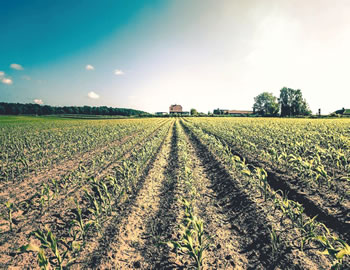Agriculture is the competent “general” that was prematurely retired from the Olympian height of playing a dominant role in the Nigerian economy. With the economy now virtually in tatters, the “knight” in a shining armour must patriotically respond to the appeal to come to the rescue of our nation. However, its effectiveness in this role is subject to a number of conditions that did not previously exist and which hinge on sustainability.
First is the potentially enormous internal market that needs to be consolidated by banning the importation of competing agricultural products and for which the nation should be prepared for a pitiless and protracted, if not endless, battle against smugglers and their internal and external collaborators. The internal collaborators are the corrupt public officials whose days may be numbered with the zero tolerance for corruption of the present political leadership. The external collaborators are the foreign suppliers of the smuggled products, who possess the wherewithal, and that possibly enjoy subsidy, to undersell local producers. They may therefore be a harder nut to crack, possibly requiring retaliatory and resolute approach. Not to be underrated in reducing national crop yield is climate change which, however, is a universal problem.
Whereas foreign exchange can be preserved by banning importation or minimizing it with high tariffs, its direct acquisition with agriculture is by exportation. This can be achieved by targeting a trade zone and by negotiating with those outside it, consisting of those actually in need because of internal production problems and those that require bilateral agreements. The latter may take the form of the old fashioned but useful “trade by barter” since it would be fair that countries to which Nigeria is a market for manufactured goods should also patronize her agricultural market (produce) in compensation.
The second consideration is the continuous satisfaction of local and external demands for the agricultural products so as not to undermine the whole scheme. Indeed, production will be stimulated by price incentive generated by a stabilized market, while profitability will be maximized by research-based cutting edge technology from the myriad of agricultural and veterinary institutions in the country.
All the same, rather than production being open-ended, one limiting factor or another will ultimately arise. This factor is expectedly the availability of arable land, even when intensive cultivation and irrigation are adopted. The extent to which agriculture can be used to diversify the economy is, on this account, open to speculation. Moreover, land in general is subject to competing demands. However, not all exportable farm products may be affected by land constraint or scarcity and, in fact, there may be none, especially at the initial stage and this may lead to overproduction and a price fall below production cost. Overproduction will, therefore, be a red signal for remedial action to prevent or limit its recurrence and for the storage of the surplus. This will need to be worked out proactively or from the standpoint of crossing the bridge when it is reached.
The third consideration is augmenting foreign exchange earnings with value-added products. Efforts in this direction start from the agricultural institutions turning out superior genetic materials through the use of modern technology for the most marketable farm products. Although such farm products of the best quality may be adequate for exportation, industrialization is also essential to add value to the domestic market and even, to some extent, exportation. Otherwise the useful “lesson” of importing our crude oil from foreign refineries would seem to be lost. In fact, local production of fuel from the domestic plants should be considered.
Related to this issue is the reliance on foreign experts to solve local agricultural challenges, which is a wasteful expenditure of hard-earned foreign exchange. Of what value then are the agricultural institutions? After all, their facilities can be upgraded for any specific purposes. In fact, agriculture in Nigeria is being technologically starved in spite of the presence of several agricultural institutions. As a remedy, the approval of agricultural loans should be contigent on commitments to employ agricultural graduates. This would go a long way in solving or minimizing youth unemployment.
The fourth important consideration is the privatisation of industries, of which agriculture is typical and critical. Pooling resources for productive or marketing purposes, facilitated by the formation of cooperatives or boards, does not go against any government policies. However, the elevation of agriculture from the status of mere commercial enterprise for individuals or groups to that of a national instrument of economic diversification is of government concern because it involves legislation. And only the government can enact laws against importation and engage in foreign trade negotiations, even state governments are, at best, of less effectiveness in such negotiations.
The fifth consideration is the coincidence of the expected revamping of the agricultural sector with the financially troubled times of the nation. The available investment fund is evidently less than that of a more prosperous earlier time(s). Moreover, the gestation period of agriculture should be factored in. In short, agriculture should now urgently be accorded priority.
Lastly, there may be no end to the news media articles, like mine, on the virtually magical power of agriculture in salvaging the economy, but which may amount to the usual academic exercise or wishful thinking, that is, if no practical steps are taken. Hence, a blueprint for the cost-effective investment in agriculture is required. Otherwise the investment may become counterproductive, amounting to a waste of funds and a betrayal of trust of youths who may see themselves as cannon fodders in a poorly planned and managed economy.
- Professor Oluyemi was a former Dean of the Faculty of Agriculture and Forestry, University of Ibadan.
WATCH TOP VIDEOS FROM NIGERIAN TRIBUNE TV
- Let’s Talk About SELF-AWARENESS
- Is Your Confidence Mistaken for Pride? Let’s talk about it
- Is Etiquette About Perfection…Or Just Not Being Rude?
- Top Psychologist Reveal 3 Signs You’re Struggling With Imposter Syndrome
- Do You Pick Up Work-Related Calls at Midnight or Never? Let’s Talk About Boundaries






